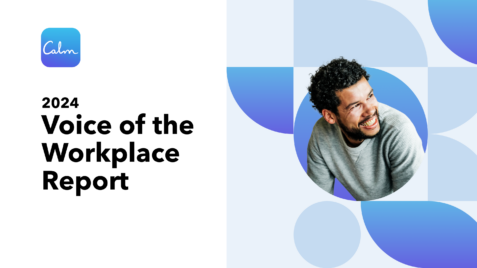Clinically reviewed by Chris Mosunic, PhD, RD, MBA, Chief Clinical Officer, Calm
Once on the fringes of benefits strategy, mental wellbeing now sits front and center to global workforce strategy. According to the Business Group on Health, more than 90% of enterprise employers plan to maintain or grow their workforce well-being programs in 2025 despite rising healthcare costs, for example.
Procurement teams are a pivotal part of this shift. As mental well-being emerges as a critical business priority, the role of procurement teams is evolving beyond cost savings, vendor compliance, and contract efficiency to focus on mental health access, engagement, equity, and measurable outcomes.
The shift toward whole-person health in procurement
The strategic focus on workforce well-being reflects the ongoing negative impact of a mental health crisis that continues to worsen long after the pandemic. According to Axa’s 2025 Mind Health Report, an alarming 57% of young adults report “struggling” or “languishing,” and 32% of global respondents report experiencing at least one mental health condition. High levels of stress are associated with significantly lower productivity and work satisfaction, and untreated depression contributes to missed work days, reduced productivity and higher total and outpatient healthcare costs.
On top of these pressures, in-scope employers must also comply with the Mental Health Parity and Addiction Equity Act (MHPAEA), which requires their employee health plans cover mental health or substance abuse support, if provided, in the same way they cover physical healthcare. Organizations that fail to offer parity between mental and physical health benefits risk legal issues, bad press, and attrition of employee talent.
In the face of these risks, procurement teams are selecting mental health programs that
- Help them meet MHPAEA parity requirements.
- Support the diverse needs of employees.
- Are easily accessible and engaging for employees.
- Can demonstrate measurable positive outcomes, such as reduced healthcare costs, improved productivity, and increased employee satisfaction.
Mental health gaps are now a business risk
In fact, enterprise organizations that fail to adequately support employee mental health put their goals at risk. Here are a few ways:
- Chronic stress that leads to burnout negatively affects employee productivity and retention. According to Gallup, burnout-related productivity losses and turnover cost organizations $322 billion annually.
- Burnout-related turnover costs are estimated to be the equivalent of up to 20% of total payroll, and the opportunity cost of poor well-being is an estimated $20 million for every 10,000 employees.
- Absenteeism rates are three times higher in employees with mental health conditions than those with physical health conditions (excluding progressive physical illness).
Clearly, support for holistic well-being is no longer a nice-to-have but instead a foundational strategy to support business continuity.
Procurement teams are seeking measurable impact
With such high stakes, procurement teams aren’t looking for wellness perks. They’re seeking vendors that use data to prove value in the areas of engagement, utilization, clinical outcomes, and return on investment. For example,
- Engagement
Vendors must demonstrate sign-up or activation rates and how they drive and sustain engagement with programs across diverse employee populations. - Utilization
Procurement teams want to see data that provides insight into how services are being used and when, e.g., do employees increase utilization of mental health programs during crisis events? - Clinical outcomes
Vendors need to show clinically validated outcomes, such as evidence of symptom reduction or longitudinal data showing sustained health improvements.
A critical component to establishing an outcomes orientation is having ready access to data. Enterprise organizations are increasingly requiring that vendors provide 24×7 access to performance data and reporting capabilities in order to monitor engagement and utilization trends and address concerns and opportunities.
Enterprise buyers expect frictionless integration
With medical cost trend expected to rise 8.5% in 2026, large employers are taking a hard look at their vendor relationships, including those related to mental health and well-being. In addition to demanding data on outcomes, they’re requiring that products work seamlessly together rather than add complexity to their ecosystem.
According to a One Medical study, half of employees don’t have a good understanding of their employer’s health and benefits offerings, which impedes engagement and utilization of programs. By offering products that work together in a single, integrated ecosystem, enterprises can make it easier for employees to find and use the programs they need while reducing administrative complexity.
Calm Health aligns with procurement priorities
A digital mental health wellbeing product, Calm Health meets procurement requirements related to whole-person health, measurable outcomes, and seamless integration.
Calm Health
- Offers evidence-based mental wellbeing programs for people struggling with chronic illness, such as cancer, hypertension, heart disease, diabetes, infertility, and obesity.
- Provides a dedicated analytics portal that gives HR leaders insight into the top self-reported conditions across their population, a breakdown of anxiety and depression symptoms across their population over time, and data about the recommendations provided, including user views and click-through rates.
- Has proven outcomes related to employee mental health engagement, user ratings, and mental well-being.
- Is designed to seamlessly integrate with employee assistance programs and other employer and health plan benefits to help drive employee engagement and utilization of services.
- Calm Health is also HITRUST certified and HIPAA compliant, ensuring rigorous protection of personal health information. Calm holds SOC 2 Type II certification and is designed to comply with GDPR standards, demonstrating its commitment to data security, privacy, and global regulatory compliance.
Procurement teams are expanding their focus beyond cost and compliance and seeking solutions that will make a positive impact on the wellbeing of employees and the overall health of the organization. Calm Health is an enterprise-ready solution that proves impact and integrates without disruption.




